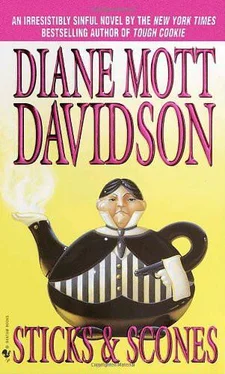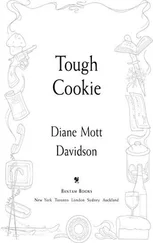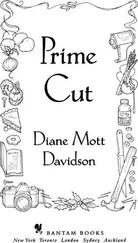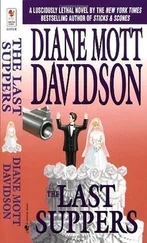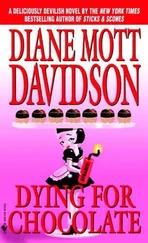In 1533, that was just what the Earl of Uckfield had done. His petition to raise his wealthy nine-year-old nephew, the orphan of his ultrarich brother-in- law, a duke, had been turned down by the monarch. In a fury, the earl had flung that letter down one of his garderobe shafts. And that was where the missive had stayed for over four centuries. It had taken a compulsively clean Swiss woman, ordering that the shaft be scrubbed, before the discovery was made.
The letter denying the earl custody of his nephew had been signed by Henry VIII. It bore the king’s initials, H. R., and his royal seal.
The letter sold for twelve million pounds at Spink’s, a leading London auction gallery. Eliot had immediately married Sukie, christening her his twenty-million-dollar woman. After their honeymoon, he announced to the media, Sukie would be embarking on a cleaning expedition of the other thirty-two garderobe shafts in the castle.
She hadn’t found anything else. Eliot hadn’t minded.
The day after Sukie’s call, I’d gone to Hyde Castle. Once seated in the imposing living room, I drank tea and ate stale, mail-ordered scones, made tolerable only by heaping tablespoons of homemade strawberry jam, Eliot’s one and only specialty. With great fanfare, tall, handsome Eliot Hyde brewed our tea. Eliot dressed like an F. Scott Fitzgerald character; for tea, he wore herringbone knickerbockers and a silk scarf. When he brewed the tea, there was no dumping of hot water over a teabag. No: Eliot tossed his silk scarf over his shoulder, removed the lid from a bone china teapot in the shape of a prissy-faced English butler, cleared his throat, and meticulously, s-l-o-w-I-y poured boiling water over Golden Tips leaves. Then he covered the pot with a cozy. Finally, he asked Sukie honeykins, as he called her, to time the steeping.
Good tea, bad food, I’d reflected, as I sipped the dark brew moments later. I’m going to love this place.
I’d told them yes, February was almost completely open for me. My son was in school every day. And I could hire Julian
Teller, our former boarder, to help with the catering, as he was taking only a half-load this semester at the University of Colorado. Plus, I added, Julian had toured the castle during his time at Elk Park Prep, and knew his way around.
I’d listened to their food proposals, nodded, and written up a contract. Eliot’s ideas sounded awfully work-intensive, but focusing on paying work, instead of on the Lauderdales, their bloodthirsty lawyer, and their Jaguar-driving cronies, was a welcome relief. In the end, Eliot and Sukie had booked Goldilocks’ Catering for two events. First would be an Anglophile lunch in appreciation of the big donors who’d paid for the new marble labyrinth set into the floor of Hyde Chapel. The second was an Elizabethan feast that would double as the end-of-season banquet for the Elk Park Prep fencing team. Eliot had been quick to clarify that the Tudor upper crust had only seen a feast as a grand meal. A banquet, on the other hand, had
been an elaborate dessert course served later, often in a charming banquet-house not unlike our modern gazebo. These days, the terms feast and banquet had become synonymous, alas. In any event, Michaela Kirovsky wanted to hold her team’s banquet at the castle.
For the opportunity to test feast-giving in their Great Hall, Eliot and Sukie were picking up half the tab.
Eliot, meanwhile, would continue working, planning, and publicizing, to ready the castle for opening as a conference center.
“That’s my dream,” he’d informed me, although his dark brown eyes looked unexpectedly sad. Above the creamy silk shirt and scarf, he had a beautifully featured, smooth-shaven face, framed by long, wavy, light brown hair. If my catered events went well, he added, we’d work out further bookings featuring historic English food.
I’d set aside any hesitation. My only other February commitment was making cookies and punch for the Elk Park Prep Valentine’s Day Dance. The chapel lunch had been scheduled for today, Monday; the Elizabethan feast, for this Friday. I’d asked Michaela Kirovsky if the fencing team wanted swordfish. Her white hair had jounced around her pale face as she laughed at my suggestion. No swordfish, Eliot had protested. The recipes he wanted me to test on the students and their parents were more of the English court variety. So I’d ordered veal roasts, to be served with a potato dish, a shrimp dish for those Catholics who’d rejected Vatican II, a rice dish, a plum tart… and Eliot and I would come up with the rest of the details this week.
Okay. Back to the present, to five minutes to six, to be exact. The sun would be rising soon on a day which found Arch and me temporarily homeless. Time to get moving.
To get to the castle, the van would have to pass through antique gates that were over half a mile from the castle itself. Those gates, bearing the Hyde coat of arms and several other painted shields Sukie had unearthed in a Denver antique shop, had been open when I’d visited three weeks ago. Were they electronically armed before sunup? I had no idea.
I stared again at the bank’s digital clock. The van was becoming warm. If I waited too long, the cooked chicken would begin to spoil. After the first question of catering: How does the food look.? there is always the second consideration: How does it hold up? Because you were never going to get to the third question: How does it taste? if it had all turned moldy green.
With sudden decisiveness, I made a U-turn on Main Street and followed ice-carved Cottonwood Creek as it flowed eastward. Every now and then, spotlights from a cabin lit up the creek. On the patches of ice, fallen snow lay strewn like spills of popcorn. Steam rose from the trickle of the creek that had not frozen.
Just beyond a Texaco station, I slowed. A lighted sign on the left side of the road indicated the entry to county-owned Cottonwood Park. This meant I was getting close to the castle. On my left, the heavily forested hills of the park rose steeply from the road. On the right, the creek was now invisible. I pressed the accelerator resolutely and the van chugged forward.
A moment later, headlights glared in my rearview mirror. I skidded onto the shoulder. We were just over half a mile from the castle. When someone shoots your window out, everything is suspect. Arch, who’d awakened, checked the side view. The vehicle passed us at a noisy clip and roared on eastward, down the canyon.
“We’re on our way to Hyde Castle,” I said to Arch. His face within his jacket hood became wary. “Poltergeist Palace? That’s where the people want you to fix the historic food?”
“Exactly. Let’s hope they’re awake.” I frowned. First the cop, now my son. Did everyone except me believe in ghosts? “Why exactly is it called Poltergeist Palace?”
“Jeez, Mom, don’t you know? The ghost
of the earl’s nephew, that the famous letter was about? After his uncle told him he couldn’t stay with the uncle’s family, the kid got sick. He died of pneumonia. Anyway, he’s supposed to run around the place at night, carrying a sword.”
“Does he hang out in the kitchen?”
“I don’t know. Michaela’s been telling us about the Great Hall, where the banquet will be on Friday night,” Arch went on. “We’re going to do a fencing demonstration before we eat.”
I powered up the cellular and pressed in the Hydes’ number. Sukie, sounding only slightly groggy, answered on the second ring. I tried to make our plight sound humorous. Not fooled, she asked in a hoarse, concerned voice where we were. Heading east, I told her, along the creek. She consulted with Eliot, then came back. When she was less than fully awake, her accent was more noticeable. Ze gates arh oh-pen, she announced. I should take care on the driveway, she cautioned, as it was long, winding, and not well lit. She gave me the security-pad code for the castle gatehouse - the imposing, twin-towered entrance to the castle itself - and said please to come immediately. I was profusely thankful.
Читать дальше
